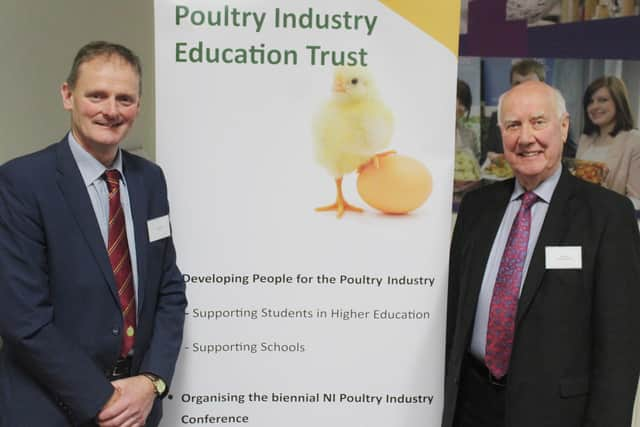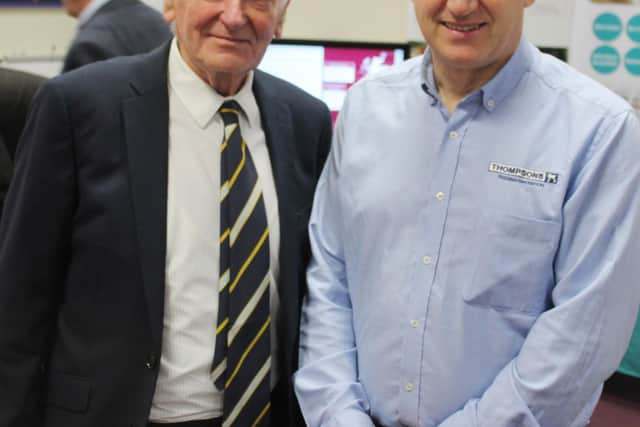Is Ireland set to become the poultry breeding centre of Europe?
and live on Freeview channel 276
He made these comments while addressing the 2023 Poultry Industry Education Trust annual conference.
The event was held recently at the Loughry campus of the (College of Agriculture, Food and Rural Enterprise) in Co Tyrone.
Advertisement
Advertisement
Reid made his assertion on the basis of Ireland’s predisposition to Atlantic winds for most of the year.


He added:
“As a consequence, the potential impact of diseases that could significantly damage our poultry sector is relatively small.
“Ireland is a natural quarantine station for the world.”
Reid noted that Scotland and many parts of the UK no longer have a meaningful poultry sector on the back of the threat posed by wind borne diseases coming in from mainland Europe.


The former Moy Park director reflected on his 60-year career to date within the industry.
Advertisement
Advertisement
He specifically highlighted the role of vaccines as a disease prevention measure within the poultry sector, adding:
“Virology is a science that continues for the poultry industry as a whole in a more than meaningful way.”
Reid also confirmed the tremendous strides made by the broiler sector in securing sustained improvements in bird performance over the last number of years.
He further explained:
“In the early days of the broiler industry, it took growers 80 days to produce a 4lb chicken. Today, this can be achieved in 33 days.
Advertisement
Advertisement
“During the same period feed conversion ratios have fallen from 2.8: 1 to 1.4:1.”
Eric Reid believes passionately that the poultry sector must be allowed to further grow into the future.
He said:
“The challenge of food security makes this an absolute necessity.
“Directly after the Second World War, there were two billion people on this planet.
Advertisement
Advertisement
"Today this figure stands at eight billion. And we are heading towards a figure of ten billion people.
“All these people will need fed. The poultry industry represents a production and processing model which other food and farming sectors should follow.”
Eric Reid concluded:
“When I joined the poultry sector, chicken was the third most popular form of meat eaten around the world. Today it is ranked at number one.
“This is because consumers recognise the health and taste attributes of chicken. It also represents tremendous value for money.
“Poultry has always been a tremendous industry to work in.
Advertisement
Advertisement
"And this will not change as the sector looks to the future.”
UFU president addresses poultry conference
Ulster Farmers’ Union (UFU) president, David Brown, also addressed the 2023 Poultry Industry Education Trust annual conference.
He used his presentation to highlight the challenge of sustainability that now confronts all sectors of agriculture.
Brown commented:
“Poultry does not get always get the same level of public awareness as is the case with other sectors within agriculture.
Advertisement
Advertisement
“But the industry still has challenges to confront, future sustainability being the most obvious one.
"And, again, this issue finds common cause across agriculture as a whole.”
Brown likened the challenge of sustainability to a three legged-stool within which the issues food security, the environment and economic viability merge together.
Where food security is concerned, he confirmed the tremendous rise in the world’s population that has been witnessed over the past seven decades.
Advertisement
Advertisement
“The global population will reach 10 billion within the next two decades,” he continued.
“And it will be the job of farmers to meet this challenge.”
Brown went on to criticise the UK government’s food security policy at two levels: a commitment to cheap food and a reliance on food imports.
He added:
“Indigenous food security levels within the UK currently sit at 60%.
"This is too low a figure, which could create strategic problems in the event of an international crisis developing.
Advertisement
Advertisement
“Northern Ireland is home to just short of 2M people. Yet our farming sectors produce enough high quality protein foods to meet the needs of 10M people.”
Brown confirmed that farmers will be in the front line when it comes to confronting climate change, air quality, water quality and the growing biodiversity challenge.
“But none of this will happen unless farm businesses are financially viable,” he said.
“If these circumstances are not allowed to prevail, farmers will be put out of businesses.
Advertisement
Advertisement
“This direction of travel will have a more than detrimental effect on the need to deliver improved food security and biosecurity levels for the benefit of all people.”
The coming months will see the Union push ahead with other stakeholder bodies to develop a new, over-arching sustainability body for Northern Ireland.
The organisation will be developed on an organic basis.
However, one of its key roles will be to facilitate the marketing of food and drink produced in Northern Ireland.
It will also play a key role in communicating the facts concerning the key role of production agriculture at the very heart of the overall response to the challenge of climate change.
No simple substitution for soya in poultry diets
Advertisement
Advertisement
There will be no quick fix when it comes substituting soya within poultry diets.
Rape meal, peas and beans do represent alternatives of a sort.
But in order to secure optimal bird performance, these protein sources will have to be supplemented with bespoke amino acids.
This was one of the key messages delivered to the Poultry Industry Education Trust annual conference by Hy-Line nutritionist Marcus Kenny.
Advertisement
Advertisement
He also pointed out that delivering a consistent nutrient supply to laying birds is critical throughout their lives.
In the first weeks of life, ensuring that the digestive tract is fully developed as early as possible is extremely important as a factor in determining life-time productivity.
Nutrition also plays an important role in making sure that on those occasions when upsets can occur, for example when birds are vaccinated, the ensuing reduction in performance is minimised.
According to Kenny breeding programmes have delivered significant improvements in performance with the layers sector, in terms of both egg numbers and individual egg weights.
Advertisement
Advertisement
He projects this trend to be fully maintained into the future.
Are NGOs the real drivers for change within international agriculture?
Meanwhile, a leading representative of the international poultry sector is confirming that Non Governmental Organisations (NGOs) are now extremely influential in determining farming policies followed at an international level.
According to Aviagen director, Tim Burnside, these groups are now directly impacting on farm-related decisions taken by both the European Union and the United Nations.
Advertisement
Advertisement
He made these assertions, courtesy of his presentation to the poultry conference.
Making much of this happen, according to Burnside is the ‘not-for-profit funding body’: Open Philanthropy (OP).
The founders of the organisation include Dustin Moskovitz, of Facebook fame, and his wife Cari Tuna.
Over the past seven years OP has made available grants totalling $300M to fund NGOs addressing issues that relate to animal welfare and other aspects of farm management.
Advertisement
Advertisement
Specifically, 39% of this money has been used to investigate matters that impact directly on the poultry sector with a further 11% used to fund projects relating to the development of meat alternatives.
Burnside continued:
“Open Philanthropy has directed 22% of these monies towards the European Union. This amounts to $63M.
“In contrast the European poultry sector has directed $600,000 in funding related activities.”
“NGOs are pushing the international debate on farming systems. Meanwhile, the poultry sector is playing catch up."
Advertisement
Advertisement
Burnside referenced the disconnect that currently exists between production agriculture and the general consumer.
He added:
“The reality is that the poultry sector has a tremendously positive story to tell.
"And all of this is science-based. But the general public are not getting to hear it.
“This situation must be actively addressed by the poultry industry.”
Advertisement
Advertisement
According to the Aviagen representative, the international poultry industry is managing to effectively address its welfare and environmental obligations on the back of what he called a “balanced breeding” strategy.
Burnside confirmed that chicken is now the most popular meat consumed around the world.
Looking to the future, the poultry sector has a number of key sustainability challenges to meet.
Fundamentally, these include the need to produce more chicken from less feed and less water.
Burnside concluded:
Advertisement
Advertisement
“Taking such an approach ensures that farmers can produce more food while also protecting the environment.”
The carbon footprint associated with chicken production has fallen by almost 50% on a per bird basis over the past 50 years.
Burnside expects these figures to improve significantly again during the period ahead.
Reflections on a very successful conference
The conference was a tremendous success, both as an event in its own right and in terms of the associated messaging.
Advertisement
Advertisement
Specifically, it highlighted the growth of poultry in Northern Ireland over many decades and the scope for the industry to develop further during the period ahead.
Chicken remains the ‘number one’ consumer meat option around the world. The reality is that poultry can deliver in terms of quality and price.
No other sector has evolved in such a meaningful way to meet consumer demand while also adapting to fast-changing welfare and environmental standards.
Conference delegates were told that white meat was once the key driver for chicken.
Advertisement
Advertisement
However, the recent past has also seen large numbers of consumers confirm a strong preference for wings and drum sticks. So, in many ways, poultry represents a role model for all other sectors of production agriculture to follow.
Improvements in genetic standards have been a key driver for the entire poultry sector over many years.
Significantly, this is a message has not been lost on our ruminant industry. AI Services’ Group chief executive, Larry Burke addressed this very issue at a recent series of farmer meetings.
He made the very salient point at a recent series of farm meetings, pointing out that genetics – and the new technologies that develop to underpin it - will allow the dairy and beef sctors to produce more from less.
Advertisement
Advertisement
This principle underpins the core challenge for farming as a whole as the industry faces-up to the all-embracing challenge of sustainability and what this means for the future.
The poultry industry has shown what can be achieved in this regard: it’s up to the other sectors of agriculture to follow.
In 1997, the Poultry Industry Education Trust was established by the Poultry Association Northern Ireland as a charitable trust. The Trust assumed two activities previously undertaken by the Association. These activities were the awarding of scholarships to students in higher education and the organisation of a biennial conference. The Trust operates throughout the island of Ireland.